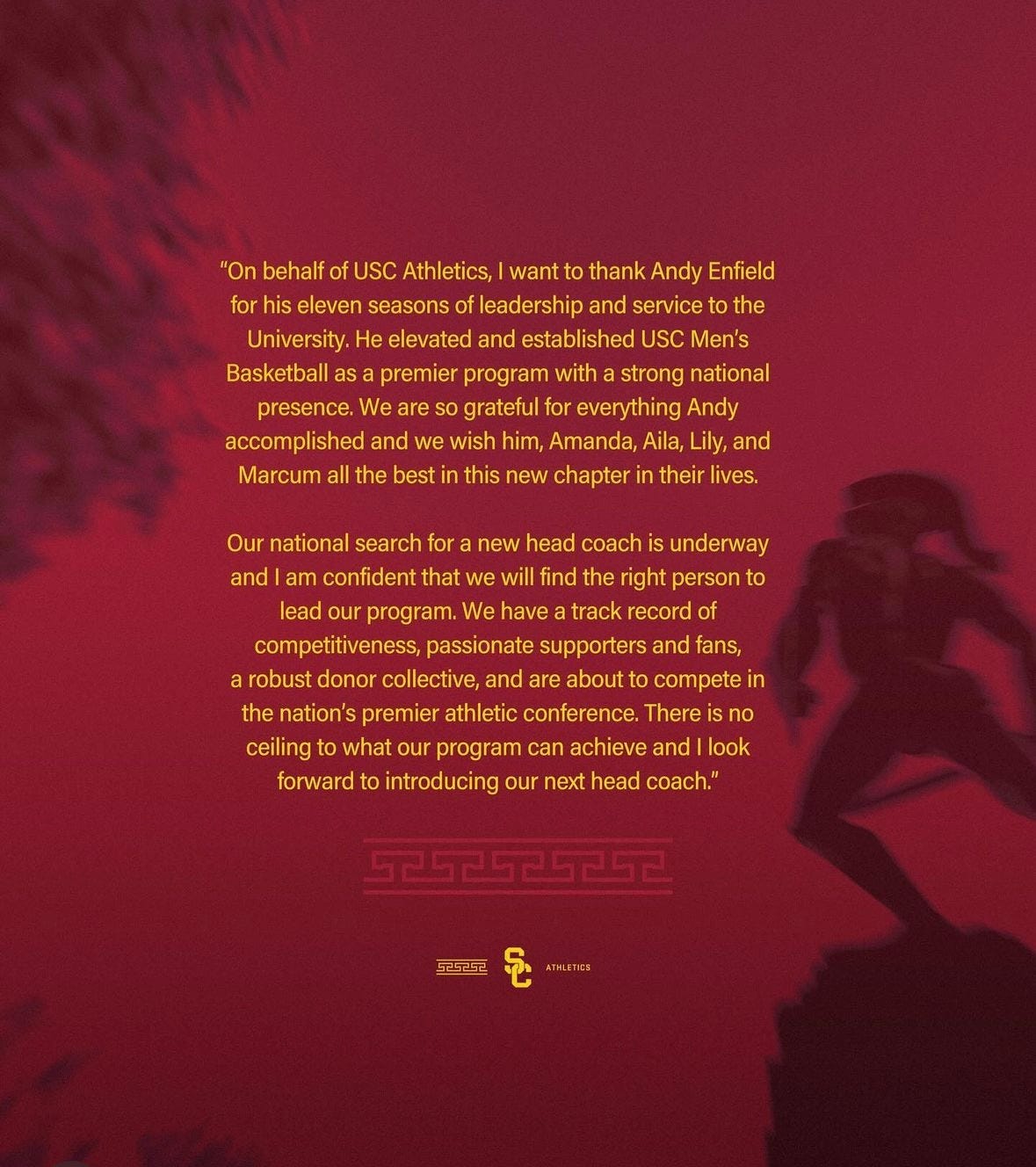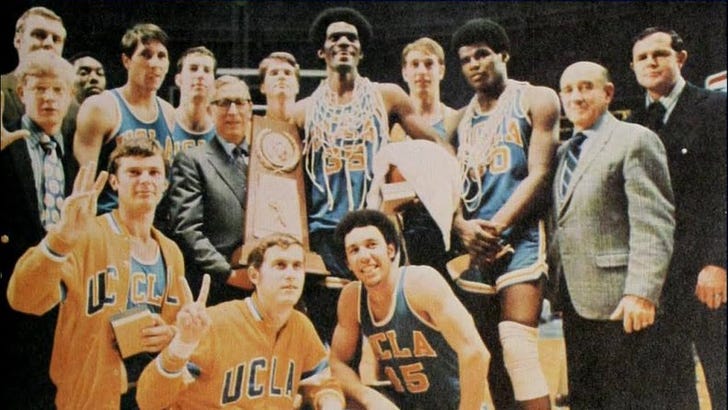Any April 1 news should be met with more skepticism than usual — unless it’s a declaration of the inevitable, like USC issuing an official statement wishing basketball coach Andy Enfield the best in his future.
Whether the destination was DePaul or SMU, enough smoke billowed in the preceding weeks that it seemed apparent Enfield was not long for Los Angeles. And, indeed, SMU was the source of the fire.
Evaluating Enfield’s 11-year tenure at USC is complicated. Of the 21 NCAA Tournament appearances in program history, nearly a quarter came under Enfield.
While that can be partially attributed to the Big Dance’s expansion, especially after 1974, Trojans basketball was more consistent during Enfield’s time at the helm than at any time in the previous 40 years.
USC’s run of consecutive NCAA Tournaments from 2021 through 2023 marked only the second time in program history the Trojans reached March Madness in three straight seasons.
The 2021 trip to the Elite Eight matched the best postseason finish of the 64/68-team era, and Evan Mobley that season became the first Trojan since Sam Clancy in 2002 to win Pac-12/10 Player of the Year.
They’d have assuredly set a record with four consecutive appearances if not for the cancellation of the 2020 Tournament, their ticket all but punched in their last game before the world shut down courtesy of Jonah Mathews.
Mathews’ buzzer-beater contributed to an almost unfathomable stretch when viewed through the lens of each programs’ history, during which USC absolutely dominated crosstown rival UCLA.
The Trojans won 6-of-7 against the Bruins from 2018-19 into 2021-22, including each of the first five matchups between Enfield-coached USC teams and Mick Cronin-helmed UCLA squads.
Such a dominant run for USC suggested a shift in Los Angeles college basketball dynamics after six decades of a power imbalance that cost the Trojans some of their most promising years.
In the 1950s, Forrest Twogood came in after the departure of USC’s greatest NBA alum, Bill Sharman, and produced three seasons that resulted in end-of-season AP rankings and a 1954 trip to the Final Four.
His 1960-61 team was his last to qualify for the NCAA Tournament, and the final Trojans squad to play in the Big Dance for almost two decades. Successor Bob Boyd oversaw the best sustained period in USC history from 1967 through 1979, including a final AP ranking of No. 5 in 1971, and he stepped down having made exactly one NCAA Tournament.
Bylaws until 1975 prevented a conference from sending more than one team to the Tournament, which cost few teams in college basketball quite as much as USC during the early ‘70s.
The ‘71 Trojans went 24-2, but the pair of losses both came to UCLA. The Bruins cruised to the Pac-8 championship and won their seventh consecutive national title under John Wooden.
While Arizona’s addition when the Pac-8 expanded to the Pac-10 forged a rivalry between the Wildcats and UCLA, based on the two largely monopolizing the conference championship from the mid-1980s until the conference’s final season, West Coast basketball has no rivalry with more genuine bitterness than the Bruins and Trojans.
It would be easy to chalk it up as a byproduct of their iconic football rivalry, or the general animus that exists between rival athletic departments. But there are few series in which one side caused the other more heartache.
Even in modern times as UCLA’s position at the basketball mountaintop slipped, subtle reminders persist that the Westwood campus houses LA’s Basketball School — like USC’s Elite Eight run, in a season that it swept the regular-season series, being overshadowed when the Bruins went on a surprise tear to the Final Four.
The inherent measuring stick of sharing a city with the most successful program in the sport’s history manifested throughout Andy Enfield’s tenure in a kind of palpable anxiety.
It’s difficult to describe, except to say it felt like he was perennially on the hot seat, even if the university’s commitment to him season-after-season suggested otherwise. Even in a sub-.500 finish endured this campaign, following a preseason Top 25 ranking and sky-high expectations, Enfield left of his own accord.
The situation parallels the mirror-opposite football rivalry, in which USC is the historic banner-carrier and UCLA the alleged “sleeping giant” with limited precedent to support the theory.
Like Enfield, former Bruins football Chip Kelly seemingly had disgruntled whispers about his job security that gained volume with each passing season, and that felt as if they started immediately.
Suggesting UCLA’s 2023 football season was as disappointing as USC’s 2023-24 basketball campaign is unfair: As an objective observer of each, Trojans hoops had reason for lofty expectations, whereas Bruins football faced an undeniable rebuild after the roster turnover from a promising 2022.
All things considered, it’s somewhat impressive UCLA won eight games for a third consecutive season under Kelly — matching stretches only achieved three times1 previously — with an LA Bowl defeat of Mountain West champion Boise State and a more-lopsided-than-the-score romp over USC.
However, UCLA’s 2023 was plagued with a lingering angst from 2022 — angst fueled in no small part by USC.
UCLA played in the first two Pac-12 football championships in 2011 and 2012, the former a matter of default due to USC serving an NCAA postseason ban. With its decade-long drought in 2022, the Bruins had gone the longest without making the Pac-12 Championship Game among the six South-division teams.
Now, the divisional model was abandoned in 2022. But not making the title game in 10 years left UCLA closer to Oregon State and Washington State — left as conference refugees due to the conference realignment triggered a few weeks before the 2022 — and a Cal program that was in its 71st year since reaching the Rose Bowl Game than it did modern league banner-carriers like Oregon, relative newcomer Utah, or even a down-by-historical standards USC.
People point to UCLA’s loss to Arizona a week earlier as costing the Bruins a Pac-12 title opportunity in 2022. Given the Wildcats finished out of the bowl picture and knocked UCLA from the AP top 10 (Playoff No. 12, in position for a New Year’s Six bowl bid), it’s an understandable position.
The Los Angeles Times ran a column in the aftermath of UA’s 34-28 win at the Rose Bowl I found insultingly dismissive of Arizona and a juvenile in its assessment of UCLA losing to an opponent that had been competitive all season, including against USC, as “a choke.” Nevertheless, it’s probably an accurate reflection of how the more vehement anti-Chip Kelly camp felt.
There’s an added layer in hindsight to this UCLA loss, with Jedd Fisch at the helm of Arizona. UA’s strong finish to the 2022 season carried over into 2023, one of the best campaign in Wildcats football history and a breakout year for Fisch that landed him with national runner-up Washington.
Fisch was a UCLA offensive coordinator and the interim head coach when Jim Mora was fired in 2017, and Fisch was unambiguous about his interest in the vacant position Kelly landed.
All that said, UCLA would still have played in the 2022 Pac-12 Championship Game had it beaten USC. The 48-45 Trojans win is an all-timer, one of the greatest games in the rivalry’s long and illustrious history, and presumably had Big Ten and Fox executives lighting Macanudo’s with hundred-dollar bills in celebration of the West Coast coup they pulled.
Arguably, the Bruins outplayed the Trojans. USC’s last flirtations with greatness as a Pacific Conference program were byproduct of the Football Gods’ turnover generosity all season, perhaps never more so than the 5-to-1 turnover difference in the Trojans’ favor that night at the Rose Bowl.
And, had UCLA won, it would have faced in the Pac-12 Championship Game a Utah team it beat by two scores in the regular season.
There’s no guarantee a conference title and trip to the Rose Bowl Game — UCLA’s first since 1998 — would have kept Chip Kelly in Los Angeles. Leaving not for a head-coaching vacancy like Andy Enfield, instead becoming Ohio State’s offensive coordinator, suggests Kelly may have been over the rigors of leading a program.
Likewise, there’s no saying with certainty had USC basketball not dealt with myriad injuries in 2023-24, including losing its two best players for an overlapping stretch in conference play — Boogie Ellis and Isaiah Collier — would have Enfield leading the Trojans into the Big Ten.
The parallels are interesting, as is the associated matter of Big Ten membership impacting each program’s future.
Although Enfield heads into a stronger basketball conference at the top than certainly the Pac-12 and arguably the Big Ten, recent results suggest more upward mobility for ACC teams. Enfield’s strength at USC, his ability to attract NBA talent, should make SMU competitive in a vein similar to Miami.
Kelly focusing on offensive strategy should be a boon to Ohio State in its pursuit of catching back up to rival Michigan.
As for both the USC basketball and UCLA football programs, fresh starts are welcomed and were probably needed. But each has bigger challenges than a single head-coaching regime, from joining a conference where both will be viewed with even less significance and still toiling in the shadow of their Los Angeles counterparts.
Red Sanders went 8-1, 8-2, 9-0 with a claimed national championship, and 9-2 with two Rose Bowl appearances from 1952 through 1955; Terry Donahue-coached teams finished 9-3, 9-2-1, 8-3-1, 10-2 and 10-2 from 1984 through 1988 in the best era of UCLA football; and 9-5, 10-3, 10-3 and 8-5 in Jim Mora’s first four seasons (2012-2015).






